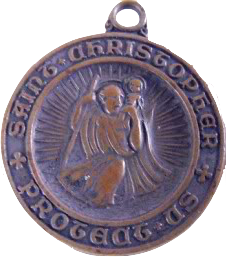Saint Christopher
Saint Christopher is a widely venerated saint in various Christian denominations, although his actual historical existence is a matter of debate among scholars. According to legend, Saint Christopher was a man of great size and strength who devoted his life to serving God by helping people safely cross a dangerous river, an act that symbolizes the trials and challenges of faith that believers must overcome.
Legend[edit | edit source]
The most popular legend associated with Saint Christopher describes him as a giant, carrying people across a raging river on his shoulders. One day, a child asked to be carried across. As Christopher proceeded, the child became increasingly heavy, making the journey difficult. Upon reaching the other side, the child revealed himself to be Jesus Christ, explaining that the weight was due to him carrying the sins of the world. This event led to Christopher's designation as the patron saint of travelers and has been a source of inspiration for Christians, symbolizing the idea of bearing one another's burdens and offering help to those in need.
Veneration[edit | edit source]
Saint Christopher's veneration is widespread, with numerous churches and chapels dedicated to him around the world. His feast day, once celebrated on July 25, was removed from the General Roman Calendar in 1969, with the Vatican stating that there was not enough evidence to confirm his historical existence. Despite this, his popularity among the faithful remains strong, and he is still commemorated in local calendars and by various Christian communities.
Iconography[edit | edit source]
In Christian art, Saint Christopher is often depicted as a giant man carrying a child across a river. He is sometimes shown with a staff to help him navigate the waters. This imagery is a direct reference to the legend of him carrying the Christ child and serves as a visual representation of his role as the protector of travelers.
Patronage[edit | edit source]
Saint Christopher is considered the patron saint of travelers, drivers, sailors, and anyone who seeks his protection while journeying. His patronage is rooted in the legend of him carrying people across the river, symbolizing safe passage through the trials of life. Many people wear Saint Christopher medals for protection, or place his image in their vehicles as a safeguard during travel.
Controversy and Legacy[edit | edit source]
The historical existence of Saint Christopher has been a subject of debate among scholars and theologians. The lack of concrete historical evidence has led some to question the factual basis of his legend. However, the moral and spiritual lessons drawn from his story continue to resonate with many Christians. Saint Christopher's legacy is a testament to the power of faith, the importance of service to others, and the belief in protection through divine intercession.
This article is a Christianity-related stub. You can help WikiMD by expanding it!
Search WikiMD
Ad.Tired of being Overweight? Try W8MD's physician weight loss program.
Semaglutide (Ozempic / Wegovy and Tirzepatide (Mounjaro / Zepbound) available.
Advertise on WikiMD
|
WikiMD's Wellness Encyclopedia |
| Let Food Be Thy Medicine Medicine Thy Food - Hippocrates |
Translate this page: - East Asian
中文,
日本,
한국어,
South Asian
हिन्दी,
தமிழ்,
తెలుగు,
Urdu,
ಕನ್ನಡ,
Southeast Asian
Indonesian,
Vietnamese,
Thai,
မြန်မာဘာသာ,
বাংলা
European
español,
Deutsch,
français,
Greek,
português do Brasil,
polski,
română,
русский,
Nederlands,
norsk,
svenska,
suomi,
Italian
Middle Eastern & African
عربى,
Turkish,
Persian,
Hebrew,
Afrikaans,
isiZulu,
Kiswahili,
Other
Bulgarian,
Hungarian,
Czech,
Swedish,
മലയാളം,
मराठी,
ਪੰਜਾਬੀ,
ગુજરાતી,
Portuguese,
Ukrainian
Medical Disclaimer: WikiMD is not a substitute for professional medical advice. The information on WikiMD is provided as an information resource only, may be incorrect, outdated or misleading, and is not to be used or relied on for any diagnostic or treatment purposes. Please consult your health care provider before making any healthcare decisions or for guidance about a specific medical condition. WikiMD expressly disclaims responsibility, and shall have no liability, for any damages, loss, injury, or liability whatsoever suffered as a result of your reliance on the information contained in this site. By visiting this site you agree to the foregoing terms and conditions, which may from time to time be changed or supplemented by WikiMD. If you do not agree to the foregoing terms and conditions, you should not enter or use this site. See full disclaimer.
Credits:Most images are courtesy of Wikimedia commons, and templates, categories Wikipedia, licensed under CC BY SA or similar.
Contributors: Prab R. Tumpati, MD



